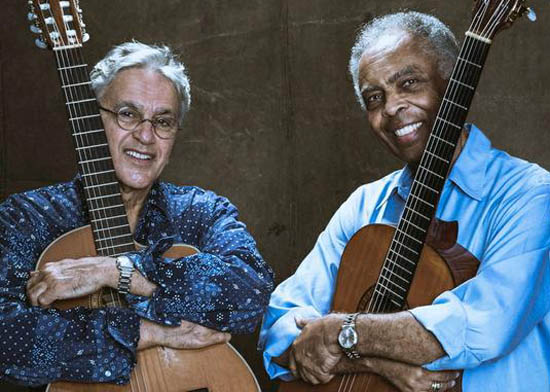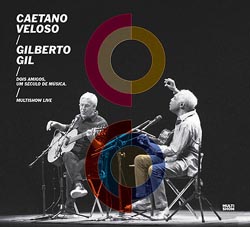|
Caetano Veloso/Gilberto Gil - Dois Amigos
|
|

Caetano Veloso/Gilberto Gil
Singer-songwriters Gilberto Gil and Caetano Veloso have been close friends, fellow political firebrands, and musical co-conspirators since the 1960s. They were at the forefront of Brazil's Bahia-forged Tropicália movement, which incorporated rock n'roll and rambunctious electric guitars into African-based folkways, while moving away from the more polite, subtle, jazz-inflected Carioca bossa nova, aka “the whisper heard around the world.” Not that these fire-eating young rebels were contemptuous of the older style; everything that came before was grist for their mill and they could inhabit the spirit of that era with best of them. The rest of the world took ardent notice. Sponsorship by David Byrne and Arto Lindsay has long since transformed Veloso into an intellectual, proto-hipster icon, while Gil's equally profound yet more overtly celebratory sound has propelled his burgeoning international career since the early 80s. Now septuagenarians, both men have been gently touched by time, achieving a mature patina while losing none of their ability to charm, inform, and enthrall. The 28 live tracks on this double CD set, largely culled from their own extensive back-catalogs, showcase the pair alone with two acoustic guitars, engrossed an intimately nostalgic give-and-take that shifts easily between soulful dialogues, worldly observations, and giddy playfulness.
The concert commences with "Back In Bahia," its bossa-inflected instrumentals rippling under laid-back unison and harmony singing. A new and previously unrecorded tune, "As Camélias do Quilombo do Leblon (Camellias Of The Lebron Quilombro)," culminates in a repetitive, chanted vamp, inciting the audience to stamp and clap along, to the obvious delight of the performers. "Tropicália," an anthem usually heard amid far more rowdy settings, retains its heady sense of unlimited horizons and youthful questing, while "De Manhã (Morning)," a gently swinging samba, was seemingly always destined for the unplugged treatment. The Veloso-penned classic "Terra (Earth)" a bears a passing resemblance to Keith Carradine's "I'm Easy" and plays like the Brazilian equivalent of American or British 70s message folk at its best. The chorus, as it generally does with sentimental local baby-boomers in the house, provokes a general, and probably quite misty, sing-along.
"Esotérico" has the aura of a solitary, late night stroll, wandering footsteps and impassioned thoughts fading to an insouciant whistle. On the darkly hypnotic "Não Tenho Medo da Morte (Do Not Fear Death)," Gil growls like an old bluesman, rapping on his guitar, the inexorable rhythm finally winding down like a failing heartbeat. The more upbeat "Filhos de Gandhi (Children Of Gandhi)" propels its message of non-violence into the face a new and equally disordered era. "Domingo no Parque (Sunday In The Park)" a typically Bahian call-and-response, does not exactly suffer from the smaller forces but does sound more natural with dueling chorales. The final selection, "A Luz de Tieta (The Light Of Tieta)," inspires still another enthusiastic outbreak of audience participation.
Overall, Gil's solo turns display the fragile, less flexible, but still warmly compelling voice of an eminence grise, while Veloso's boyish tenor, except for a slightly tentative upper range, seems almost unchanged. Moving easily from their native Portuguese into English ("Nine Out Of Ten"), Spanish ("Tres Palabras" and "Tonada de Luna Llena"), and Italian ("Come Prima"), the duo comes across as generously communicative with onlookers while primarily involved with their own interplay. It is a magical balance only seldom captured in live recordings. - Christina Roden
© 2016 RootsWorld. No reproduction of any part of this page or its associated files is permitted without express written permission.
|

|
|
|